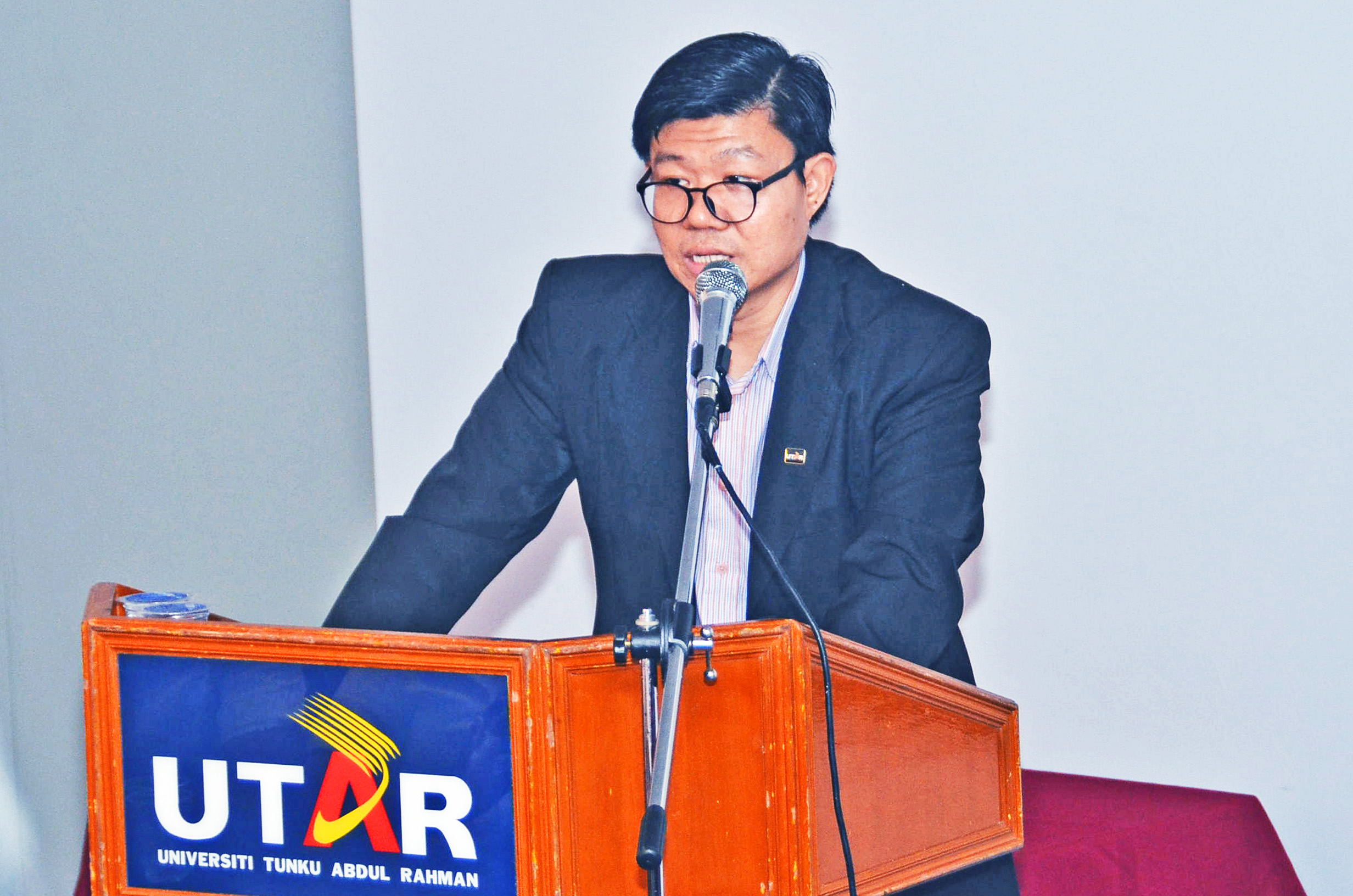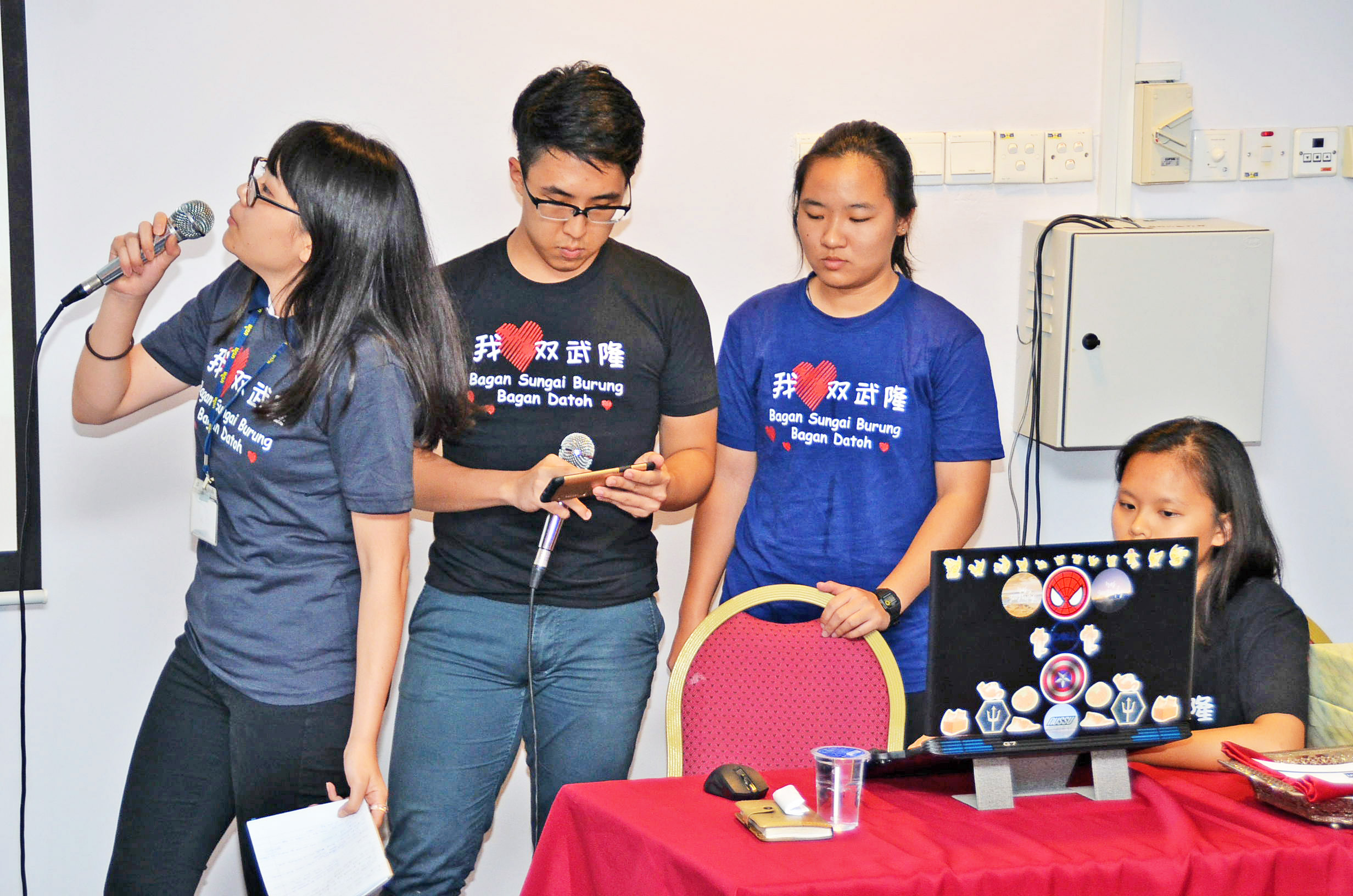
Another successful collaborative project with NUS
Front row, third from left: Hee, Mei Mei, Prof Choong and Village Heads Heng (fourth from right) and Lim (second from right) with staff and participants
The eighth UTAR New Village Collaborative Project with National University of Singapore (NUS) ended successfully with a closing ceremony organised by the Department of Soft Skills Competency (DSSC) on 16 December 2019 at UTAR Kampar Campus.
Present at the ceremony were UTAR Vice President for Student Development and Alumni Relations Prof Dr Choong Chee Keong, DSSC Head Hee Chwen Yee, NUS representative Chan Mei Mei, Bagan Sungai Tiang Village Head Lim Siok Yeok, Bagan Sungai Burung Village Head Heng Huah Pang, DSSC staff and students.
The UNVCP, as a civic engagement programme, encourages participants to practice one’s soft skills, life skills and academic learning. The programme is also aimed at helping participants acquire new necessary skills, be a more involved global citizen in the society, learn more about new villages, and identify and address communal needs. It also served as an opportune platform for participants to develop international outlooks, enhance competencies of their skills, as well as to prepare participants in becoming global citizens with a tenacity to face challenges in a diversified cultural society. The programme also enabled participants to establish networks and friendships.

Prof Choong delivering his speech
“UTAR is always committed in providing opportunities for participants to acquire new skills. Particularly through this project, our participants did not only learn about the unique background and history of the New Villages, but they also received good exposure and gained valuable lessons not found in the textbooks. UTAR is also very grateful to NUS for their continuous support and contribution, as well as to the New Villages for making this project a successful one,” said Prof Choong. He also advised participants to share the kampung spirit with their friends and families in Singapore.
The project, which involved six NUS students, was conducted from 9 to 15 December 2019. The NUS participants who visited Bagan Sg Tiang were Michael Ang Wei Shen, Goh Xin Hui, Samantha Gladys Tjong, and UTAR students Lim Soon Young and Yek Nai Yuet. Participants who visited Bagan Sungai Burung were NUS students, namely Chan Tzen Yi, Shermaine Teo Huimin, Lydia Chee Qian Ting, and UTAR students Goh Pui Hoon and Naoko Shimizu. The participants presented their findings and analyses and shared their experiences.

Participants presenting their findings and sharing their experiences from their visit to Bagan Sg Tiang (left) and Bagan Sg Burung
“I learnt that community development should be focused on building a relationship with the community members as well as between the community members. I find this very important because ultimately, what we want to do is for the community, and not just for our own learning. These are the relationships that will keep the community close-knitted. It is a good foundation for future development. Another thing I learnt about community development is that it often occurs quite spontaneously. Future community developers and young people who want to contribute to the community should capitalise on these opportunities and not having much preconceived notions, they should present themselves humbly and work with the villagers to know better. Through this project, I also learnt the importance of using different platforms. Community development does not have to be very structured because we can use available resources,” said Xin Hui.
She added, “This experience was very valuable for me, especially coming from an urban context. I could understand how it feels to live in a village, it is similar yet different. Coming to the village made me feel very welcomed and seeing how everyone is so closely-bonded warms my heart. The “人情味” is very present in the village and is something quite absent in the cities. This is what we can bring back to our community. It is also important to be able to immerse in their culture and experience it for ourselves. Only then can we genuinely understand the real meaning of trust, which is something we cannot learn from books alone.”
“I learnt about the Assets-based Community Development (ABCD) approach, livelihood and their feelings toward their current situation. I think the ABCD approach is very interesting because this is where we meet at the community’s level to understand and address their problems, unlike the familiar top-down planners. The livelihood is very different in the village, and they only have one main economic activity. As an outsider, I would consider it a hardship and their lives are not ideal because of the living conditions, but to the villagers, they are already contented and happy with their lives. Therefore, this project is important for the younger generation because of the cultural aspect it contains. Culture is shaped by people, but likewise, people can also shape culture, and the younger generation will be the ones shaping the cultures in the future. By understanding the different needs of the different communities, we can further understand the ways to enhance and help the community. Lastly, I feel this project is important to also preserve the culture and history of the villages,” said Tzen Yi.
“Firstly, I understood the different perspectives of lives, especially when we are used to city lives and going after achievements. Coming down to the village has really allowed me to see how different people define what is meaningful in their lives and I have learnt to respect the different beliefs people have. About community development, I think the government can consider redefining the ways to help these communities, and the same can be applied to NGOs or parties who would like to contribute to community development. Even if we have our careers, and if we decide to pursue this line of community development, these aspects are certainly important to study on and to be taken into consideration. Another important aspect for the younger generation to participate in such projects is having the opportunity to experience this village life for themselves and understand their perspective of life. It is important we know these communities on a personal level so we can further help them develop their community,” said Ang.
UTAR New Village Collaborative Project collaborates with local foundations, companies and foreign partnering universities to participate in the village community project. The activities involve social study, research, cultural exchange, sport-friendly matches and beautification projects for schools and homes. Collaboration with NUS was formed in 2012 and saw the first group of NUS USP students visiting five new villages in Perak. The objective was to study the social and economic development in the new villages; collect information about the histories (narratives) and cultures of the new villages; and to identify and map the community assets of the new villages as well as to generate possible social entrepreneurship and community development ideas for the new villages.
Check out the Facebook page for more photos of participants visiting the New Villages.
Read more about past collaborative projects through the links below:
Experiencing kampung life in New Villages
UTAR and NUS collaborate on community project
New Village Collaborative Project a hit again
New Village Collaborative Project with NUS
Fourth UTAR-NUS New Village Collaborative Project
Fifth UTAR-NUS New Village Collaborative Project
UTAR-NUS New Village Collaborative Project
![]()
![]()
![]()
![]()
![]()
![]()
![]()
![]()
![]()
![]()
![]()
![]()
![]()
![]()
![]()
![]()
![]()
© 2019 UNIVERSITI TUNKU ABDUL RAHMAN DU012(A).
Wholly owned by UTAR Education Foundation Co. No. 578227-M LEGAL STATEMENT TERM OF USAGE PRIVACY NOTICE